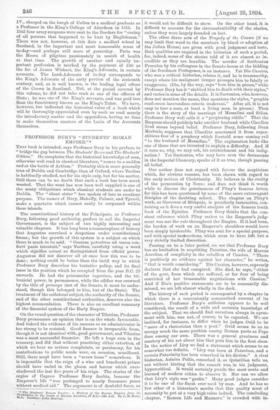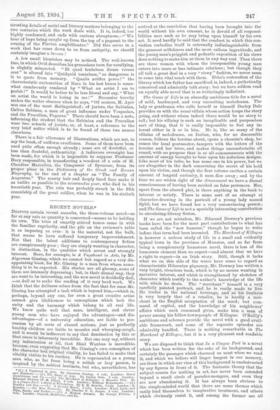PROFESSOR BURY'S " STUDENTS' ROMAN EMPIRE."* THIS book is intended,
says Professor Bury in his preface, to " bridge the gap between The Students' Rome and The Students' Gibbon." He complains that the historical knowledge of men, otherwise well read in classical literature, "comes to a sudden end at the battle of Actium." Probably this is more generally true of Dublin and Cambridge than of Oxford, where Tacitus is habitually studied, not for his style only, but for his matter. Still there can be no doubt that such a book has been much wanted. That the want has now been well supplied is one of the many obligations which classical students are under to Dublin. The "silent sister" has spoken of late to excellent purpose. The names of Bury, Mahaffy, Palmer, and Tyrrell, make a quartette which cannot easily be surpassed within these islands.
The constitutional history of the Principate, as Professor Bury, following good authority, prefers to call the Imperial Government, is the subject of two highly interesting and valuable chapters. It has long been a commonplace of history that Augustus exercised a despotism under constitutional forms ; but the growth of this system is a subject on which there is much to be said. " Omnem potentiam ad mum con- ferii pads intestuit," says Tacitus, carefully using a word which signifies actual as distinguished from official power. Augustus did not discover all at once how this was to be done ; nothing could be better than the lucid way in which Professor Bury describes his tentative policy, and its final issue in the position which he occupied from the year B.C. 23 onwards. He had the proconsular imperium, and the tri- bunicial power, in permanence, while the edifice was crowned by the title of princeps (not of the Senate, it must be under. stood, though this belonged to him, but of the State). The treatment of the collateral subject, the authority of the Senate, and of the other constitutional authorities, deserves also the highest commendation. There is also an excellent summary of the financial system of the Early Empire.
On the vexed question of the character of Tiberius, Professor Bury pronounces an opinion that is on the whole favourable. And indeed the evidence of his success as an administrator is too strong to be resisted. Good finance is inseparable from, though it is not identical with, good government, and Tiberius was a most successful financier. He left a huge sum in the treasury, and did that without practising either extortion, of which we hear no serious complaints, or parsimony, for his contributions to public needs were, on occasion, munificent. Still, there must have been a "screw loose" somewhere. It is impossible that the reign of a wise and beneficent prince should have ended in the gloom and horror which over- shadowed the last five years of his reign. The stories of the orgies of Caprete Professor Bury doubts, because the Emperor's life " was prolonged to nearly fourscore years without medical aid." The argument is of doubtful force, as • The Students' Roman Empire: a History of the Roman Em fro from its Foundation to the Death of Marcus Aurelius, 87 B.C.-180 A.D. By J. H. Bury. M.A. London John Murray. it would not be difficult to show. On the other hand, it is difficult to account for the circumstantiality of the stories, unless they were largely founded on fact.
The other three acts of the Tragedy of the awsare (if we may limit that word to the members by blood or adoption of the Julian House) are given with good judgment and taste. Both qualities are required in the historian of such a period, for, indeed, some of the stories told of it are almost as in- credible as they are horrible. The murder of Scribonius Proculus by his colleagues in the Senate-house at the bidding of the freedman Protogenes, is an instance. Yet Dio Cassius, who was a critical historian, relates it, and he is trustworthy, except where his malignant temper prompts him to falsify or exaggerate. (Dio, by the way, says "tore him in pieces," while Professor Bury. has it " stabbed him to death with their styles," and varies in some of the details. It is Suetonius, who, however, does not mention the name, that mentions the styles, " graphite confossum lacerandum ceteris traderent." After all, it is not easy to tear a man, at least a living man, in pieces.) Then there is the story of the marriage of Messalina and Silius.
Professor Bury well calls it a "perplexing riddle." That the Empress should publicly take another husband while Claudius lived seems beyond belief. Professor Bury, following Dean Merivale, supposes that Claudius sanctioned it from super- stitious fear of a prophecy which foretold some coming evil " to the husband of Messalina." The explanation looks like one of those that are invented to explain a difficulty. And if it were so, why, we may ask, his astonishment and his indig- nation ? Yet Suetonius, who may have seen the documents in the Imperial Chancery, speaks of it as true, though passing all belief.
Our author does not regard with favour the scepticism which, for obvious reasons, has been shown with regard to the early notices of Christianity. He believes in the reality of the persecution by Nero; and does not think it worth while to discuss the genuineness of Pliny's famous letter, for this has been questioned by some of the more extravagant disciples of the doubting school. The chapter on Pliny's work, as Governor of Bithynia, is peculiarly instructive, con- taining as it does a very useful analysis of the famous tenth book of the Epistles. Professor Bury thinks that the con- stant reference which Pliny makes to the Emperor's judg- ment was not the rale throughout the Empire. If it had been, the burden of work on an Emperor's shoulders would have been simply intolerable. Pliny was sent for a special purpose, and with special instructions, which seem to have left but a very strictly limited discretion.
Passing on to a later period, we see that Professor Bury has no hesitation in acquitting Palatine, the wife of Marcus Aurelius, of complicity in the rebellion of Cassius. " There is positively no evidence against her character," he writes, " that is worth considering." Dio Cassius, however, expressly declares that she had conspired. She died, he says, "either of the gout, from which she suffered, or for fear of being convicted of her treasonable negotiations with Cassius." And if Die's positive statements are to be summarily die- missed, we are left almost wholly in the dark.
The history of each period is accompanied by a chapter in which there is a conveniently summarised account of its literature. Professor Bury's criticism appears to be well considered, the result of a wide and accurate knowledge of the subject. That we should find ourselves always in agree- ment with him, was not, of course, to be expected. We are inclined, for instance, to differ when he judges Ovid to be " more of a rhetorician than a poet." Ovid seems to us to occupy much the same position among Roman poets as Pope does among our own. There was a general greatness and mastery of his art about him that puts him in the first class. In the notice of Livy we find a statement which seems to us somewhat too definite. "Livy was born at Patavium, and a certain Patavinity has been remarked in his diction." A rival historian, Asinius Polio, remarked it, as Quintilian tells us, not without hinting that the remark was, in his judgment, hypercritical. It would certainly puzzle the most acute and learned of modern critics to observe it. Nor can we allow that Livy's style was "prolix." Many good judges consider it to be one of the finest ever used by man. And he has so few other of a historian's merits that this quality must of necessity be put at a very high value indeed. The concluding chapter, " Roman Life and Manners," is crowded with in- teresting details of social and literary matters belonging to the two centuries which the work deals with. It is, indeed, too highly condensed, and ends with curious abruptness,—" We hear of boys being caught up from the top of a pageant to the awning of the Flavian amphitheatre." Did this occur in a work that has come down to us from antiquity, we should certainly imagine a lacuna !
A few small blemishes may be noticed. The well-known line, in which Ovid describes his precocious turn for versifying, is slightly misquoted. " Et quod tentabam dicere versus erat" is altered into " Quidquid tentabam," so dangerous is it to quote from memory. "Qualls artifex pereo ! " the characteristic exclamation of Nero in his last hours is some- what cumbrously rendered by " What an artist I am to perish !" It would be better to be less literal and say, " What an artist the world is losing in me ! " Excessive brevity makes the writer obscure when he says, "Of orators, M. Aper was one of the most distinguished ; of jurists, the Sabinian, °feline Sabinus, a man of great influence under Vespasian, and the Proculian, Pegasus." There should have been a note, informing the student that the Sabinian and the Proculian were two schools of jurists, or, at least, a reference to the very brief notice which is to be found of these two names elsewhere.
There is a fair allowance of illustrations, which are not, to say the least, of uniform excellence. Some of them have been used quite often enough already ; some are of doubtful, or less than doubtful, authenticity. A ludicrous oversight has been made, for which it is impossible to suppose Professor Bury responsible, in transferring a woodcut of a coin of M. Claudius Marcellus, the Conqueror of Syracuse, from its proper place in the Dictionary of the Greek and Boman Biography, to the end of a chapter on " The Family of Augustus." The scanty hair and deeply lined face make it as unlike as possible to the miserandus purr, who died in his twentieth year. The coin was probably struck in the fifth consulship of the great soldier, when he was in his sixtieth year.

































 Previous page
Previous page